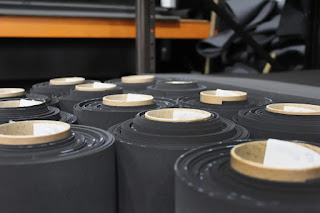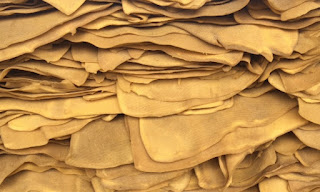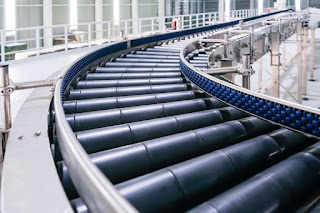 |
| source: Atlanto |
Certain materials become fundamental components in many professional industry applications thanks to their resilience, versatility, and adaptability. One of these versatile materials that find applications across various industries, from manufacturing to healthcare, is the rubber sheet. Offering unique properties and specifications, these rubber products have become indispensable in a wide range of settings. We explore the different types of rubber sheets, their applications, and the benefits they offer.
What Are the Different Types of Rubber Sheets?
 |
| source: tradekey.com |
Rubber sheets are made of rubber or cloth coated with rubber. They come in many designs and have different specifications, lengths, widths, and thicknesses, making them suitable for different purposes. This wide variety available on the market today makes the rubber products highly demanded for industrial, commercial and residential usage. Explore some of the most distinctive types of rubber sheet for sale and learn more about their specific properties so you can select the most appropriate ones for your needs.
Natural Rubber Sheets
Derived from the latex sap of the rubber tree, the natural rubber sheet offers excellent elasticity and resilience. They are known for their high tensile strength and tear resistance, making them suitable for applications where flexibility is crucial.
Synthetic Rubber Sheets
Manufactured from petroleum-based chemicals, synthetic rubber sheets are engineered to exhibit specific properties such as oil resistance, weather resistance, and chemical resistance. Examples include neoprene, nitrile, and EPDM rubber sheets.
Neoprene Rubber Sheets
Neoprene rubber sheets are a type of synthetic rubber known for their excellent resistance to oil, ozone, and weathering. They are commonly used in gasket and sealing applications, as well as in the construction of weather-resistant covers and sleeves.
Nitrile Rubber Sheets
Nitrile rubber sheets, also known as NBR sheets, possess exceptional oil and fuel resistance, making them ideal for use in automotive and aerospace industries. They are also widely used in sealing applications where resistance to oils and chemicals is critical.
EPDM Rubber Sheets
Ethylene Propylene Diene Monomer (EPDM) rubber sheets exhibit excellent weather resistance, UV resistance, and thermal stability. They are commonly used in outdoor applications such as roofing membranes, waterproofing, and automotive seals.
Silicone Rubber Sheets
Silicone rubber sheets offer high-temperature resistance, making them suitable for applications involving extreme heat or cold. They are used in industries such as food processing, medical devices, and electronics, where hygiene and temperature stability are essential.
What Are Rubber Sheets Used For?
 |
| source: inventiatech.in |
With a diverse composition and distinctive properties, certain types of rubber sheet for sale may find extensive applications across a broad range of professional industries, from mining and construction, to food production and processing, and more.
Gaskets and Seals
Rubber sheets are widely used in the fabrication of gaskets and seals for various industries, including automotive, aerospace, and manufacturing. They provide effective sealing against fluids, gases, and environmental contaminants.
Vibration Isolation
Rubber sheets are employed in machinery and equipment to dampen vibrations and reduce noise levels. They absorb shock and vibration, protecting sensitive components and improving overall equipment performance.
Flooring and Mats
Rubber sheets are utilized as flooring materials in commercial and industrial settings due to their durability, slip resistance, and impact absorption properties. They are also used to manufacture anti-fatigue mats for workplaces where employees stand for extended periods.
Conveyor Belts
Rubber sheets are an integral component of conveyor belts used in material handling systems. They provide traction, durability, and flexibility, enabling the smooth and efficient transport of goods in industries such as mining, agriculture, and logistics.
Weatherproofing and Insulation
EPDM rubber sheets are commonly used for weatherproofing and insulation applications in construction. They form a durable barrier against moisture, UV radiation, and temperature fluctuations, enhancing the longevity and energy efficiency of buildings.
Medical and Healthcare
Silicone rubber sheets are utilized in medical and healthcare applications due to their biocompatibility, sterilizability, and flexibility. They are used in the fabrication of medical implants, prosthetics, surgical instruments, and tubing.
Benefits of Rubber Sheets
 |
| source: Ideogram |
• Versatility: Rubber sheets are available in a wide range of formulations and thicknesses to suit diverse applications, offering designers and engineers flexibility in material selection.
• Durability: Rubber sheets exhibit excellent resistance to abrasion, tearing, and degradation, ensuring long-term performance even in harsh operating environments.
• Sealing Properties: Rubber sheets provide effective sealing against fluids, gases, and contaminants, preventing leaks and ensuring the integrity of enclosed systems.
• Shock Absorption: Rubber sheets absorb shocks and vibrations, reducing noise levels and protecting machinery and equipment from damage.
• Temperature Resistance: Certain types of rubber sheets, such as silicone and EPDM, offer high-temperature resistance, enabling their use in applications involving extreme heat or cold.
• Chemical Resistance: Synthetic rubber sheets, such as neoprene and nitrile, exhibit excellent resistance to oils, fuels, and chemicals, making them suitable for applications in challenging environments.
Final Take
Rubber sheets play a crucial role in various industries and applications due to their versatility, durability, and unique properties. Whether it's sealing, insulation, vibration isolation, or protection, rubber sheets offer solutions to meet the diverse needs of modern manufacturing and engineering. When selecting these materials, it’s important to consider the specific requirements of your applications and the benefits they offer.
No comments:
Post a Comment